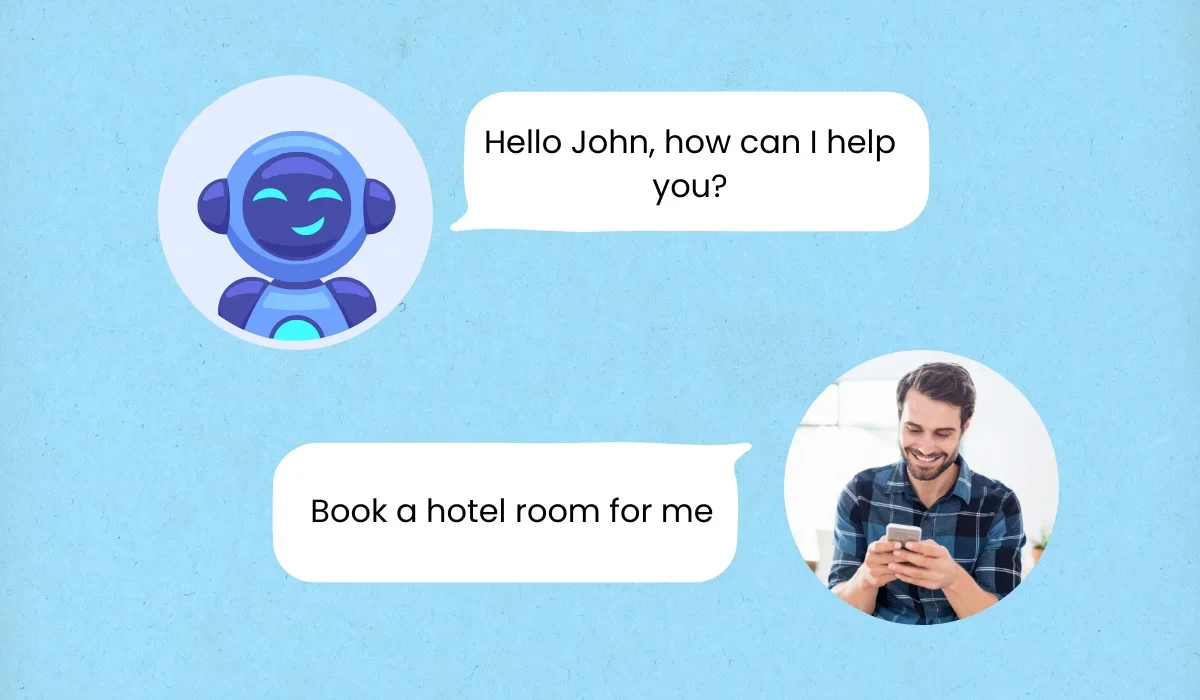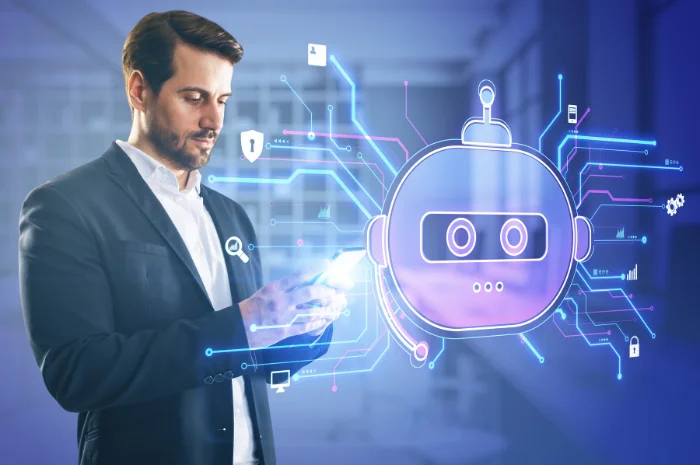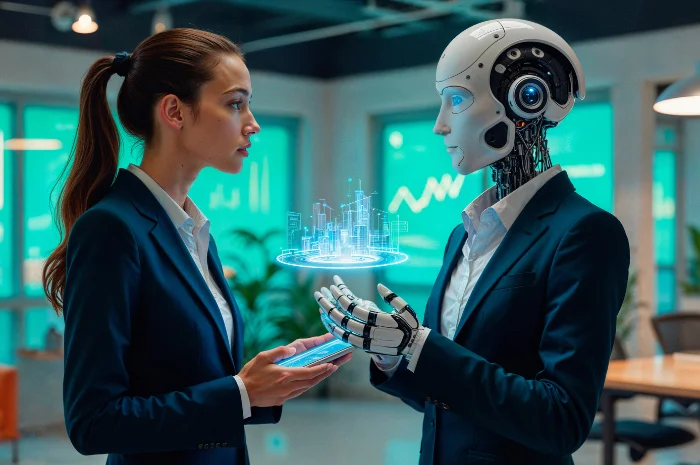AI chatbots are new allies of hoteliers in providing excellent and unforgettable experiences to their customers. They’re also an excellent source for streamlining processes and a viable solution for the ever-present problem with staffing.
You will be amazed to know that 76.9% of consumers use chatbots to access services and report issues. It’s great news for hotel owners, and they should take full advantage of chatbots to grow their hotel business. However, many are unaware of the benefits of AI chatbots for hotels. We are here to help.
In our blog post, we will tell the benefits of chatbots for the hotel industry and what they are capable of doing. So, let’s get started.
What is a Hotel Chatbot?
Hotel chatbots are artificial intelligence-powered assistants created to communicate with guests and prospective customers, enriching their experience by offering 24-hour support. Chatbots can handle various tasks, such as responding to frequently asked questions, helping with reservations, providing live customer service in real-time, and offering recommendations on dining and entertainment options.
In addition, hotel chatbots can assist with room service requests and ensure that guests receive speedy and efficient services without human intervention. Chatbots can be adept at communicating in multiple languages, making them extremely useful in helping guests from all over the world and ensuring they feel comfortable and accepted.
These chatbots play an important role in collecting feedback via surveys, allowing hotels to continually improve their services based on guest feedback. Chatbots can notify guests about special promotions and discounts, encouraging them to use remarkable deals and increasing their overall experience.
Through automation of these interactions, an AI chatbot for hotels increases personalized services and operational efficiency. This convenience and personalization results in a smooth and pleasant stay of customers, increasing their loyalty and satisfaction. Additionally, the information gathered by chatbots could provide important insights into guests’ preferences and habits, allowing hotels to improve their services and marketing plans.
The Evolution of Chatbots in the Hospitality Industry
The rise of chatbots within the hotel industry has ushered in an era of new guest interaction. Initially, chatbots could respond to frequently asked queries and offer essential information regarding the hotel. As technology advances, chatbots become more efficient and adept at performing complicated tasks.
Modern hotel chatbots can help guests in various ways, such as booking reservations, requesting room service, offering suggestions for nearby activities, or tourist destinations. Their capacity to recognize and respond to user queries through conversation has made them invaluable solutions for enhancing the customer experience.
Chatbots can also customize guests’ interactions. Chatbots can provide personalized recommendations and advice by studying guests’ preferences and past interactions, creating an unforgettable experience for every user. This personalization feature increases not only guest satisfaction but also loyalty.
Alongside their roles in interacting with guests, Chatbots can also supply hotels with insightful insight and information. By analyzing conversations and interactions with guests, hoteliers can gain invaluable insights into guests’ preferences, pain points, and areas for improvement. The data collected with the customer’s consent can help improve marketing strategies, the quality of services offered, and the overall efficiency of operations.
With the advancement of technology, chatbots’ capabilities within the hotel industry will increase. By integrating speech recognition and natural language recognition, chatbots will be more nimble and adept at providing seamless experiences to guests. The future of chatbots within the hotel industry is exciting, and their contribution to increasing guest satisfaction is undisputed.
Top Reasons Why Every Hotel Needs An AI Chatbot

In a world where more companies are focusing on staff efficiency and prioritizing more efficient customer service, chatbots that AI powers are rapidly becoming a significant element in the hospitality industry. Here, you’ll find 9 reasons chatbots are integral to many hotel management strategies.
1. 24/7 Customer Service
Modern consumers expect quick responses from customer service. This is particularly challenging for the hospitality and travel business, as customers worldwide might have queries at various times. Chatbots at hotels can assist by offering 24/7 customer support. In simple terms, it means customers will get a quick reply, irrespective of the timing of the day, especially during those times when there isn’t anybody available to assist them directly.
2. Increase Direct Bookings
Chatbots are a key element in encouraging direct bookings to hotels by providing 24/7 availability and prompt responses to inquiries about bookings. This availability allows guests to book reservations whenever they want without delay. Through an intuitive interface, chatbots streamline the booking process, cut down on the amount of effort required, and increase conversion rates.
In addition to streamlining reservations, AI hotel chatbot also provides suggestions based on guests’ preferences, suggests suitable rooms, and offers special deals or discounts that are available to direct bookings. This personalized approach allows customers to book directly via the hotel’s website instead of third-party apps and websites.
Chatbots can also provide immediate assistance to resolve any issues that arise during the booking process and follow-up communications to re-engage customers who expressed interest but didn’t make reservations. Integrating seamlessly into the hotel chatbots’ booking engine can ensure that reservations are handled efficiently, increasing direct bookings and less dependence on third-party booking channels.
3. Provide More Efficient Room Service
Chatbots in hotels can take care of guests’ room service or housekeeping requests, allowing customers to place orders for beverages, food, and other services without contacting the reception desk. The chatbots can respond instantly, reducing the time required to fulfill their requests. After placing their order, they can also contact guests to collect feedback regarding services and food to enhance customer satisfaction.
4. Support Throughout the Booking Journey
Hotel AI chatbot can increase bookings that have been completed and decrease the number of reservations that are abandoned. It offers efficient, personal service throughout the booking process. Guiding users step-by-step helps ensure a smooth experience and encourages users to complete their reservations.
Chatbots can play a crucial role in enhancing the customer experience by interacting with customers from the beginning. They can ask relevant questions to better understand the user’s preferences, including the kind of hotel they’re looking for, their budget, and any other specific needs. This initial contact aids in gathering vital information that will enable them to tailor the experience to meet the customer’s needs.
The most common problem encountered during the booking process is the time-consuming and complex process of identifying the best solution. Chatbots make this easier by swiftly searching through alternatives and presenting options that meet the customer’s criteria. This makes it easier to decide and decreases the chance of abandonment.
Chatbots also offer immediate assistance for any concerns or queries arising when booking. Whether clarifying information about booking, explaining the pricing, or resolving issues, chatbots can provide immediate support, keeping the booking process running smoothly.
Providing personalized suggestions and prompt assistance to chatbots can enhance users’ experience, decrease frustration, and ensure that more reservations are made successfully. Chatbots’ ability to handle many questions simultaneously ensures that customers get prompt responses, increasing their satisfaction and decreasing the chance of cancellation.
5. Up-Sell and Cross-Sell Opportunities
Apart from helping increase the number of direct bookings, chatbots could also give a hotel more chances to increase sales and cross-sell. This occurs because the chatbot’s conversations can help identify and highlight opportunities for the client, increasing the likelihood that they will take advantage of these opportunities.
When booking, the chatbot may utilize the information collected to promote additional options for breakfast or spa service. Chatbots can also suggest an upgrade if an option is chosen for a specific room. The chatbot may also provide the restaurant’s availability in real time.
6. Personal Experience
Chatbots powered by AI can assist hotels in offering a much more personal customer experience. Through asking smart follow-up questions, the hotel chatbot will be able to determine guests’ preferences and continue to provide suggestions for things to see, places to go, activities to do, rental car services, or restaurants.
7. Communicate in Multiple Languages
Irrespective of whether you employ an AI or rule-based chatbot in hotels, you can help domestic and international customers. Hence, reducing the need to hire staff who can speak multiple languages. Thanks to AI chatbots, they can understand and respond in multiple languages, giving customers a familiar experience.
8. Reduced Burden on Customer Service Staff
Today, hotels’ customer service departments can easily be overwhelmed. They must manage guest interactions across various channels, including in-person contact, social media platforms like Facebook and Twitter, email, and handle feedback from customer surveys.
Chatbots at hotels could ease the pressure by offering responses, reducing the backlog, addressing many simple or common customer service inquiries, and allowing staff to take care of more difficult instances.
9. Efficiency
It’s a fast-paced world of hospitality, and guests are looking for a quick response. If your front desk personnel has to attend to urgent issues, chatbots may aid guests in checking in or out and avoid having to go to the front desk when working in a hurry. Shorter front desk queues during peak times increase guest satisfaction. The reduction of repetitive tasks and the improvement in efficiency are just a few of the numerous benefits of checking-in automatization.
10. Round-The-Clock Availability
Even after regular business hours, hotel staff or the customer support team can guide and support the guests. This reduces the number of employees required for assistance without disappointing the customers. A chatbot can assist guests with information and respond to requests throughout the day and night. This type of rapid response is essential for customer satisfaction.
11. Scalability
Chatbots will never be able to take on the role of humans, nor can they replace the personal touch that comes from face-to-face interaction which is at the heart of hospitality. However, they can aid in managing an increasing workload, meaning that hotels can handle seasonally high volumes without upscaling or downscaling the staff and resources.
12. Customer Engagement and Retention
To enhance the guest experience at every stage, use chatbots to engage customers. They excel at upselling and offering personalized recommendations, which have been shown to increase guest spending and retention.
How Can Chatbots Be Used?
AI chatbots for hotels have become essential tools within the hotel industry. Their diverse applications go beyond simple interactions with customers, providing various features that improve guest experiences and speed up hotel operations. With the help of the latest AI with Natural Language Processing (NLP) capabilities, chatbots can accomplish a range of tasks effectively and efficiently.
- Advanced AI Capabilities: The most sophisticated and advanced bots operate on artificial intelligence. An AI hotel chatbot is created to understand the broader context of users’ questions, perform necessary actions, and offer accurate answers.
- Rule-Based Bots: Although some bots operate under a set of guidelines created by bot-building software, they are usually designed for simpler tasks. However, AI-powered chatbots can tackle more complex and intricate tasks.
- Natural Language Processing (NLP): AI hotel chatbots utilize Natural Language Processing (NLP) to detect queries and provide the appropriate responses. This allows chatbots to process and understand human language efficiently.
- Primary Goal The primary objective of an AI chatbot for hotels is to aid travelers in finding solutions no matter their location or what devices they’re using. The chatbot allows guests to easily and quickly book reservations directly with the hotel.
- Enhancing Staff Efficiency: AI-powered chatbots for hotels enable hotel staff to connect instantly with guests via chatbot, increasing the effectiveness of their interactions while lessening the burden of responding to frequent questions every day.
- Customer Communication: Chatbots offer the ability to communicate directly with guests. This instant communication is especially useful in periods of shortages in labor as it ensures that service to customers is uninterrupted.
- Operational Support: Chatbots for AI hotels have been transforming into valuable tools for hotel personnel, assisting them in managing all the demands of their jobs and increasing overall efficiency.
Must-Have Features in a Hotel Chatbot
If you choose AI chatbot development for your hotel, ensure it is compatible with these functions.
1. Integration of the Booking Engine
A hotel chatbot can enhance the volume of direct reservations because it is connected to booking engines. The chatbot can quickly create an online booking form that includes pricing, room types, and pictures in various languages. With a chatbot, you can ensure that the price and availability are precise because it’s integrated into the booking engine. This prevents the loss of revenue.
2. Artificial Intelligence
Intelligent virtual agents rely on machine learning to learn how your guests might ask to be served. The most advanced AI models can comprehend complex questions and give specific answers essential for ensuring guest satisfaction in the hospitality industry.
3. Multilingual
In today’s global market, multilingual support is essential for businesses that want to connect effectively with a diverse audience. Studies show that customers are more inclined to interact with a positive attitude and purchase products when they can communicate with them in their native language. In reality, 76% of people prefer to engage with businesses using their own language.
To this end, multilingual capabilities are an essential attribute of chatbots. They facilitate seamless interaction with clients from diverse backgrounds, enriching the customer experience and increasing the probability of reserving. With the help of several languages, chatbots ensure that every customer receives individualized and efficient support regardless of location or the language they prefer.
Chatbots with multilingual support are not just a benefit but an essential requirement in today’s competitive marketplace. The ability to assist in multiple languages can help bridge the gap between communications and make it easier for customers from other countries to connect with your company.
This inclusivity can increase engagement rates and customer satisfaction, as users feel valued and understood. By addressing the diverse linguistic needs of your audience, chatbots can capture a broader market, reduce barriers to booking, and foster a more inclusive brand image. This capability enhances customer experience, drives conversion rates, and strengthens your global presence.
4. Automation
The top hotel chatbots automate various processes, such as messaging guests prior to arrival, checking-in reminders, and post-stay surveys. Utilizing automated guest messages, hotels can schedule messages on the preferred channels and issue tickets on the spot.
5. Live Chat
The best customer experience involves seamlessly switching the conversation to a human agent whenever required since AI chatbots are limited in their tasks. With a seamless handoff method, users can easily contact a human agent in complicated scenarios.
6. Unified Inbox
Controlling the customer service channels is an enormous challenge for hoteliers because of their growing quantity. The more channels hotels have, the more difficult it is to handle them all simultaneously. Omnichannel customer service management could make connecting all communication channels to one display easier. Furthermore, it decreases the possibility of errors resulting from miscommunication and other problems arising when using multiple platforms.
7. Customized Design & Replies
When selecting a chatbot to integrate into your business, it is vital to ensure the brand is consistent. You must be able to modify the logo and color scheme. Additionally, maintaining uniformity in your bot’s tone, language, and voice is vital to keeping your brand’s identity. Make sure you plan your communications strategy to improve your guests’ experience.
Overcoming Challenges in Hotel Chatbot Implementation
While an AI hotel chatbot has many advantages, it also create some challenges. We’ll examine a few of the obstacles we face and discuss possible solutions.
1. Addressing Privacy Concerns
Data security and privacy are the most important considerations when implementing hotel chatbots. Customers may be reluctant to divulge their details or insecure about AI software handling their personal information. To combat these fears, hoteliers must prioritize privacy and data security.
Incorporating privacy policies that provide precise consent mechanisms and ensuring data is stored securely are essential for building customer trust. Hotels can ease worries and promote guest interaction via chatbots by showing the importance of guests’ privacy and security.
2. Ensure Seamless Integration into Existing Systems
Another area for improvement with hotel chatbot design is ensuring an atmosphere compatible with current systems. Chatbots need to be able to connect to relevant information from hotel management software, booking platforms, and different hotel systems to supply precise and current data.
Hoteliers must work with their IT team or AI chatbot development company to develop solid interoperability protocols. This will allow chatbots to access the required data and provide guests with up-to-date, real-time data during their interactions.
Future of Chatbots in Hotel Industry
While chatbot technology continues to improve, using a hotel chatbot built on Artificial Intelligence (AI) will likely be employed to increase the number of points of contact with customers. Though rule-based chatbots will likely continue to be valuable for longer, the advantages of AI-based alternatives are undisputed. Since this technology is becoming more user-friendly and more affordable to deploy, many rule-based hotel chatbots will likely be replaced by robots with artificial intelligence.
As voice recognition grows and people are more comfortable with it, chatbots will likely become more voice-based rather than text-based. The future will see several developments. Essential developments will likely enhance the translation of languages using voice recognition. This will allow anyone anywhere around the globe to interact with a chatbot via voice and receive a reply in the same language they are using.
Conclusion
AI chatbots have transformed the hotel industry, changing the way hotels run and improving the experience for guests. By automating the booking process and offering 24/7 customer support, these modern tools tackle common issues like high demand at busy times and a lack of staff availability. They allow hotels to provide rapid, personal service that meets the needs of today’s technology-savvy travelers.
In hotels, AI chatbots streamline operations, reduce the burden on front desk staff, and increase efficiency overall. The staff can concentrate on providing excellent customer experiences instead of being distracted by mundane inquiries. Chatbots for customers provide effortless, fast service and immediate assistance, which makes interactions more efficient and enjoyable.
As the hospitality industry grows and evolves, investing in AI chatbots is more than an option but an essential requirement. The adoption of this technology will put hotels at the forefront of technology and result in efficiency and increased customer satisfaction. In the future, hospitality will use AI to develop more efficient and personalized services. This is the ideal time to make the investment in AI chatbots to benefit from this revolutionary technology.



